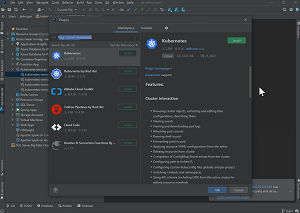News
Azure Toolkit for IntelliJ Now Supports Kubernetes, Virtual Machines
The latest monthly update to Java on Azure Tooling adds support for Azure Kubernetes Service (AKS) in the IntelliJ toolkit, along with support of Azure virtual machines.
Microsoft's Java on Azure Tooling dev team manages the Azure Toolkits for Java repo on GitHub, which includes tooling for the Eclipse and IntelliJ IDEA IDEs, and it's the latter that now supports AKS.
"
Azure Kubernetes Service (AKS) simplifies the deployment of a managed Kubernetes cluster in Azure by offloading the operational overhead to Azure," said Microsoft in an Aug. 17
announcement. "We have been consistently hearing from our customers that they want better AKS integration to view pod logs, manage clusters and workloads.
"In our latest release, Azure Kubernetes Service (AKS) cluster is available on Azure Toolkit for IntelliJ, so that developers can manage Azure Kubernetes Service directly in Azure Explorer."
 [Click on image for larger, animated GIF view.] Working with AKS in Animated Action (source: Microsoft).
[Click on image for larger, animated GIF view.] Working with AKS in Animated Action (source: Microsoft).
The new virtual machine support, meanwhile, lets developers directly run or debug applications on an Azure Virtual Machine in IntelliJ IDEA.
Noting that it can be complex for developers to launch an Azure Virtual Machine within JetBrains' IDE and then connect to it, the team added a "Azure Virtual Machine" item to the "Run On" targets list of run/debug configurations of IntelliJ IDEA.
"Azure Virtual Machines (VM) is one of several types of on-demand, scalable computing resources that Azure offers," Microsoft said. "We know that running or debugging applications in another environment such as Azure Virtual Machine will be essential for Java developers, who want to build applications in the cloud or create environments for development and testing."
The dev team also made it easier to search Azure account subscriptions -- which will be especially helpful or teams or organizations that have many Azure subscriptions -- while also helping developers find official documents and blogs more easily by adding more entries to the settings menu in Azure Explorer.
"With this feature, you can not only open the Azure SDK Reference Book to find more support, but also easily contact us by reporting issues or requesting features, as well as providing feedback. Besides, the Dev Blogs and Documentation also bring more useful resources," Microsoft said.
IntelliJ IDEA has been getting much more attention than its Eclipse counterpart lately, as the team in June announced an update to Java on Azure tooling highlighted by a new application-centric view for the Azure Toolkit for IntelliJ that's designed to make the IDE's interface more user friendly. And in last month's update, for another example, the team introduced a new getting started experience for the IDE.
All of the above comes as Microsoft is in the middle of a big push to tout Java for Azure development, claiming that "We use more Java than one can imagine."
About the Author
David Ramel is an editor and writer at Converge 360.